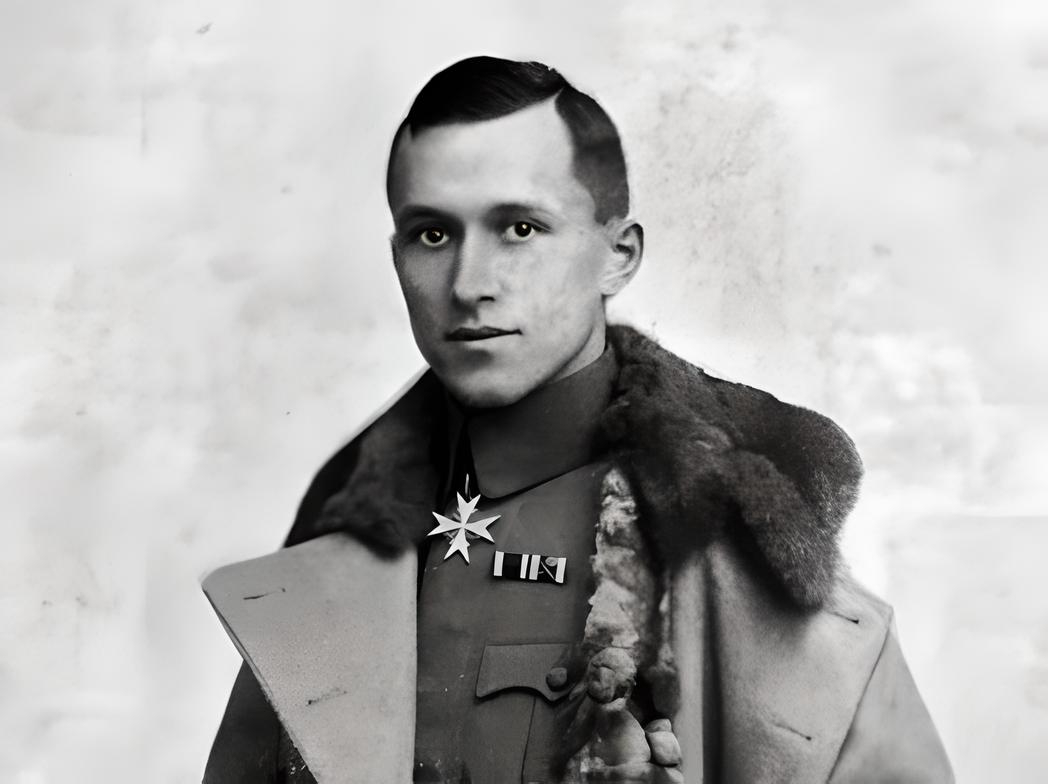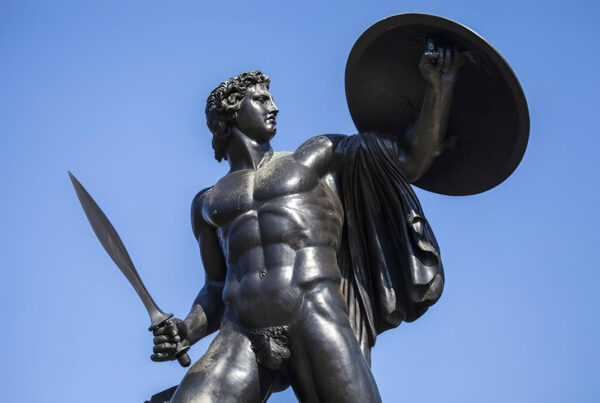The true statesman and historian feels himself to be an element in the stream of change that flows unalterably.
This is a recurring theme of Spengler that I strongly disagree with. He believed that great men are those able to wield the technics of their times but completely missed the key to understanding our technics’ increasing will over us. This missing piece also helps to illuminate a reoccurring pattern in history that shows the only way to transmute or change the path of a people or the world.
There is an ever-changing web of potential destiny and will — this includes the will of people and of our technics, i.e., the temptation in creation itself to create a physical utopian stasis via technics. Great people have a stronger pull on the web but they always face the test of temptation to hold their own will or to become subject to the will of the times/technics.
The only transmutative power is self-sacrifice. This is what Lycurgus, Caesar, Jesus, and many others understood. A leader must be willing to sacrifice himself for his people or he will end up making his people the sacrifice. This pattern, too, is very obvious in history. Heavy is the head who wears the crown because if he is not willing to water the tree of life for his people, then it is his people who pay.
The web is constantly changing and those who act courageously earn favor of the gods and a stronger pull on synchronicity. Ernst Jünger was the eye of the storm in World War 1, with most of his men constantly dying around him in the shock troops he lead. His willingness to die, his courage in saving others, and his bravery in battle were otherworldly and he gained from it the protection of synchronicity. He was not pointlessly reckless with disregard for life; he was fighting like a hero for his people.
He literally became the eye of the storm because he was supposed to be the lawgiver and lifegiver in the next war as leader of Germany. His unwillingness to seize his potential destiny and lead in World War 2 granted him a long life to see how horrible the world would become while the spirit of his people died for it. Hitler was no Jünger in World War 1 and did not pass the test of sacrificial love over temptation in his manner of leadership and hiding in a bunker. This doomed the German people to become the sacrifice, even sending out children while Hitler hid.
If you read Jünger’s writing before World War 2, it was all passion and fire. He had great creative energy and the will to act upon history. His Storm of Steel is likened to the Iliad — ironically, Lycurgus the lifegiver’s inspiration for his decrees and my first inclination that his potential destiny was to be the lifegiver. Jünger’s On Pain was all about ascetic warrior will over technics: “Tell me how you relate to pain and I will tell you who you are.” His interwar articles are the most inspiring works I have ever read, with complete application to current times. They are timeless works, and if the SS and National Socialism had been based around those articles, it would have strengthened Germany and gained more possible allies to rally around his call. Instead of dividing Germans around the hyper-materialistic vantages that many great thinkers of the times warned against, Jünger would have been the backbone of the German spirit in its opposition to globalism.
Somehow, Jünger shirked the duty to take a leadership role and put no effort into it. He created a void where the web made possible an inflection point and fooled himself into thinking it was honorable. From that point, he took a passive position, and I have finally come to terms with the fact that this great man, and king who never was, was as responsible for dooming Germany to be the sacrifice as much or more so than Hitler. I do not think he ever realized it but you can see it in the shadow of all his later work. You can see him become defeatist, self-serving and a passive actor.
He let his son and namesake die in his place on the Marble Cliffs; he “inspired” (a very feminine art — men inspire by charging and not by using their clout to let them be passive-aggressive actors) all the doomed acts to take power from Hitler — yet another example of how if a leader inspires from a safe position instead of seizing leadership himself, he dooms those that follow. His later work is plagued with common themes of suicide, of nostalgia for past times, of the gods dying young, of Cain and Abel, of inescapable modern horrors of globalism and decay.
The Glass Bees is depressing but accurate at depicting where we are heading with our technics … and very defeatist compared to his On Pain. The Forest Passage talks of sacrificing against the Leviathan of the times but he himself did not when the time called. It also conflictingly talks of staying the ship but escaping into the forest, with no talk of taking the ship over. Eumeswil goes on to accept defeatism and fatalism in the face of the tyranny of only one type of leader and the self-serving nature of the anarch. It is relatable for many that never had the chance for his greatness but for him it overshadows the fact that he was meant to be a self-sacrificing leader. His anarchic character instead has no ability to transmute or change and is a reactive and opportunistic actor… How far he fell from the hero he was for Germany in World War 1.
Courage is the wind that drives them to distant shores, the key to all treasures, the hammer that forges great empires, the shield without which no culture exists. Courage is the effort of one’s own person to the last consequence, the jump start of an idea against matter, without care for what comes of it. Courage means to let oneself be nailed to the cross for one’s cause. Courage means, in the last moment of life, to still show allegiance to the thought for which one stood and fell. To the devil with the times that want to take from us courage and men.
What happened to the man that wrote such words that he could not fulfill them? He recognized the dangers of inaction, utopianism and ease of life in On Pain and called to action in his interwar articles against globalism. How did he go from the eye of the storm defying death throughout all of World War 1 to passive-aggressive opposition in World War 2 without trying to take leadership in between? His later work speaks of a haunted man… His long years are symbolic of his lack of transmuting the hardship placed on his people into glory and rebirth. His old years seemed to be a curse for him to see all that he could have changed, and his denial of that forever changed his character. His work is very well written and to the point of many modern issues with insight, but his soul and values are a hollow shell of his younger self. I have loved him for most of my adult life, but I only realized this a couple of years ago.
Likewise, Jews becoming increasingly mercantile and their leadership unwilling to sacrifice will continually cause their own people to become the sacrifice. The unrecognized patterns in history are very easy to see once you realize that self-serving or self-saving leaders doom, and self-sacrificing leaders transmute the death sentence of their own followers to life. The way to spot a life-giving leader is their own willingness to martyr themselves before the children of their people. The way to spot a fool who will bring dystopia to his followers and make them the sacrifice is his own utopianism and unwillingness to self-sacrifice over self-serving while placing their future generations in harm’s way.
Spengler was also wrong about the future needing another Caesar. It is not a Caesar but a Lycurgus, the lawgiver (this part is majorly over-emphasized; he only gave five precepts but giving his life was the most significant aspect of his law) and lifegiver that would be capable of transmuting the curse of globalism and freeing the hero subsumed in the trader. Caesar and Agustus were not free of their self-serving materialism, so even if Caesar’s sacrifice was enough to give new life of empire to the old republic, it cost them their line and it did not end the curse. The Roman Empire then became an evolutionary step of one form of the same meta-zeitgeist as Sparta subsumed by Athens (they might have won the war but in trying to hold them they lost their own spirit to the materialism of Athens and 500 years post-Lycurgus they fell to all he warned of). We are in the final hour and must reroot soon when Trump wins, giving us opportunity. Doing so will allow for a lifegiver to utilize an infection point out of this cursed age back to the lost heroic age.








Rose, Thank You for an incredibly insightful, inspirational and meaning filled article.
“We have but a single moment at our disposal. Let us transform that moment into eternity, No other form of immortality exists.” – Nikolas Kazantsakis from, “Report to Greco”
Let us hope and pray that if and when those moments truly beckon, we obediently and resolutely heed their call.
“Ex Lux In Tenebris Lucet”
Thank you for taking the time to read it for understanding and respond.
I’ve not read much of the Bible and never heard that quote before looking up the English translation. I like it.
Good quotes.